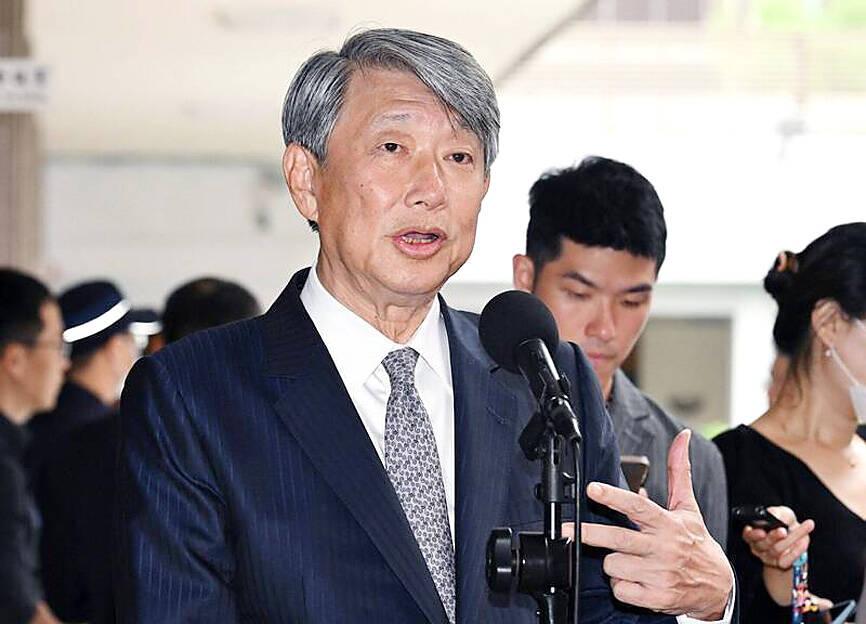Minister of Economic Affairs J.W. Kuo (郭智輝) yesterday apologized for comparing the potential Taiwan Semiconductor Manufacturing Co (TSMC)-Intel joint venture to marrying someone “from a family with inherited ‘Mongol syndrome.’”
“You’re going to marry a woman, but you know that Mongol syndrome runs in her family. Will you marry her?” Kuo said of TSMC and Intel’s joint venture during a radio broadcast interview on Friday.
“That takes great determination. Not that Mongol syndrome is a bad thing, but it’ll pose a long-term risk to your descendants and cause them distress,” he said.

Photo: Taipei Times
Kuo’s remarks provoked an outcry from disability groups.
The term “Mongol syndrome” (along with related terms like “Mongolism” or “Mongolian idiocy”) was discontinued by the WHO in 1965 because it was deemed scientifically inaccurate, racially misleading and offensive, particularly following a formal request from the Mongolian government.
The WHO officially replaced it with “Down syndrome” named after John Langdon Down, a British physician who was the first to accurately describe the distinctive features of the condition in the 1860s.
Sun Yi-hsin (孫一信), deputy secretary-general of the Parents’ Association for Persons with Intellectual Disability, said that Kuo’s remarks were “profoundly discriminatory.”
Comparing a risky joint venture to marriages involving families with inherited Down syndrome “seriously undermines the marital rights of people with Down syndrome, as well as their siblings and relatives,” he said, citing the Convention on the Rights of Persons with Disabilities.
The French physician Jerome Lejeune in 1959 discovered that Down syndrome is caused by a chromosomal abnormality, but the root causes remain to be understood, so no family can be excluded from the possibility of having a child with Down syndrome, Sun said.
“We know that each child in the world is unique, and we never give up on any opportunity for our children to thrive,” he said.
Down Syndrome Foundation chairman Lin Cheng-hsia (林正俠) wrote on Facebook that it is heart-wrenching to know that children with Down syndrome are being referred to as having “Mongol syndrome,” especially so close to World Down Syndrome Day on March 21.
“While society is becoming more inclusive and accepting of people with Down syndrome, the head of the Ministry of Economic Affairs compared marrying someone from a family with Down syndrome to a risky joint venture. This is outrageous and we strongly express our protest,” he said.
Kuo in a statement yesterday apologized for his remarks.
“My understanding of Down syndrome was outdated, but my remarks are wrong whether I made it in the past or the present,” he said.
“For the distress caused to people with Down syndrome, people who are offended and the companies due to my inappropriate, incorrect analogy, I sincerely apologize,” Kuo said, adding that he would reflect upon himself and be more careful with his words.
Additional reporting by CNA

The manufacture of the remaining 28 M1A2T Abrams tanks Taiwan purchased from the US has recently been completed, and they are expected to be delivered within the next one to two months, a source said yesterday. The Ministry of National Defense is arranging cargo ships to transport the tanks to Taiwan as soon as possible, said the source, who is familiar with the matter. The estimated arrival time ranges from late this month to early next month, the source said. The 28 Abrams tanks make up the third and final batch of a total of 108 tanks, valued at about NT$40.5 billion

Two Taiwanese prosecutors were questioned by Chinese security personnel at their hotel during a trip to China’s Henan Province this month, the Mainland Affairs Council (MAC) said yesterday. The officers had personal information on the prosecutors, including “when they were assigned to their posts, their work locations and job titles,” MAC Deputy Minister and spokesman Liang Wen-chieh (梁文傑) said. On top of asking about their agencies and positions, the officers also questioned the prosecutors about the Cross-Strait Joint Crime-Fighting and Judicial Mutual Assistance Agreement, a pact that serves as the framework for Taiwan-China cooperation on combating crime and providing judicial assistance, Liang

A group from the Taiwanese Designers in Australia association yesterday represented Taiwan at the Midsumma Pride March in Melbourne. The march, held in the St. Kilda suburb, is the city’s largest LGBTQIA+ parade and the flagship event of the annual Midsumma Festival. It attracted more than 45,000 spectators who supported the 400 groups and 10,000 marchers that participated this year, the association said. Taiwanese Designers said they organized a team to march for Taiwan this year, joining politicians, government agencies, professionals and community organizations in showing support for LGBTQIA+ people and diverse communities. As the first country in Asia to legalize same-sex

MOTIVES QUESTIONED The PLA considers Xi’s policies toward Taiwan to be driven by personal considerations rather than military assessment, the Epoch Times reports Chinese President Xi Jinping’s (習近平) latest purge of the Chinese People’s Liberation Army (PLA) leadership might have been prompted by the military’s opposition to plans of invading Taiwan, the Epoch Times said. The Chinese military opposes waging war against Taiwan by a large consensus, putting it at odds with Xi’s vision, the Falun Gong-affiliated daily said in a report on Thursday, citing anonymous sources with insight into the PLA’s inner workings. The opposition is not the opinion of a few generals, but a widely shared view among the PLA cadre, the Epoch Times cited them as saying. “Chinese forces know full well that